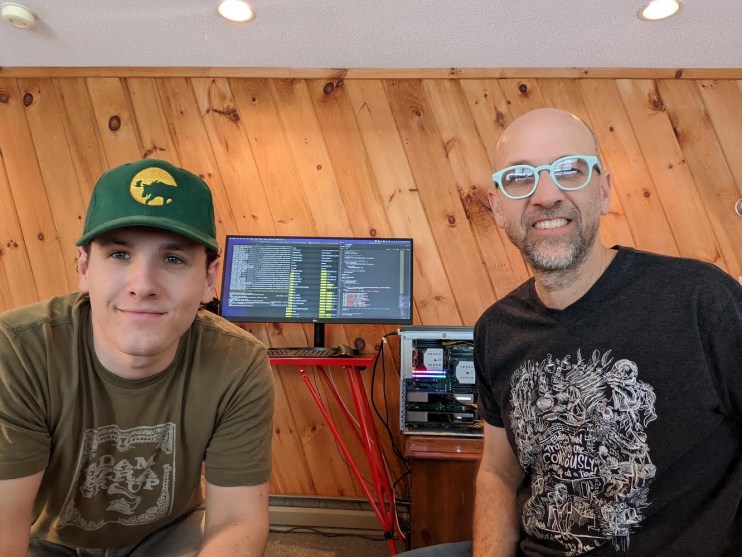Meet the hackers helping people recover lost crypto assets

Tomas, 43, a film director from London, made a “speculative bet” on Bitcoin back in 2013, investing a few hundred quid in the world’s first crypto currency. By January 2021 the whim had paid off big time, with his initial investment now worth tens of thousands of pounds.
There was just one catch. Tomas’ Bitcoin was locked away in a crypto wallet and he could not remember the password.
“I actually bought the Bitcoin pretty hungover,” Tomas admits to City A.M..
While he could remember 10 of the 12 characters he had used in his password he grew frantic as failed attempts to unlock his wallet racked up and the price of Bitcoin spiralled higher.
“Originally, it was a speculative bet so I didn’t really care so much. But when it was hitting new highs every month I thought it would be stupid to not pursue this harder,” said Tomas.
A gift from the past
In desperation, he took a chance on two strangers he met over the internet, enlisting the help of father and son crypto hackers Chris and Charles Brooks. Together the pair run a firm called Crypto Asset Recovery which helped Tomas recover $30,000 worth of lost Bitcoin by cracking open his wallet using an algorithm.
“It’s an amazing gift from my hungover self in the past,” said Tomas who admits he would have sold his Bitcoin long ago, at a much lower value, had he remembered the password.
By now stories like Tomas’ are all too familiar – early crypto adopters finds themselves cut off from a sizeable fortune because they lost hard drives, passwords or private keys securing assets which once seemed worthless. Around $140bn worth of Bitcoin is lost or left in wallets that cannot be accessed, according to crypto data company Chainanalysis.
The rest is history
Hoping to capture a share of the market, Chris Brooks, 50, set up Crypto Asset Recovery in 2017, later closing it down to focus on other projects. He revived the firm, which helps people recover Bitcoin, altcoins and NFTs, with the help of his 20-year-old son in January 2021.
“Within two and a half weeks we got our first payday,” Charles told City A.M.. “That’s when we realised there’s a business here that we can still run. The rest is history.”
The pair have been inundated with requests over the past year as Bitcoin soared to a new all time high above $69,000. Business is going so well, in fact, that Charles dropped out of his computer science degree in order to focus on his new career full time.
“If the price of Bitcoin is going up, people come out of the woodwork,” Chris explained.
The pair claim to have recovered Bitcoins totalling “seven figures” in value just this year. The largest sum the Brooks recovered from a single wallet address was $280,000.
The business works on a commission basis, taking a 20 per cent cut of assets recovered up to a value of 10 BTC, and a 10 per cent commission on assets valued over 20 BTC.

Trust based business
While the business is thriving it’s not always smooth sailing for the family run service. Chris and Charles revealed that they spent several months trying to crack open a wallet which they believe held 12 Bitcoin.
“When we cracked it I was skipping down the hall trying to do that thing where you kick your heels together,” said Charles. “We open it and there was like $2.38 inside.”
The firm must also contend with the possibility of fraud. The company receives multiple e-mails every week from people claiming to be Satoshi Nakamoto, the pseudonymous creator of Bitcoin. Other prospective clients have asked the pair to recover crypto which they claimed belonged to relatives who have died.
“This is a very trust based business,” said Chris. “The clients need to trust we’re not going to steal the money. And we need to trust the people we’re talking to.”
‘I’m not sure investing is for you’
Thorny legal and security issues involved in wallet recovery shine a light on friction points which persist in the crypto space, with retail traders exposed to high levels of risk when they experiment with unregulated financial products which lack a centralized authority.
If a user sends assets to the wrong wallet address in error, the funds are often unrecoverable. Likewise, no one can reset your password if you opt to use a non-custodial wallet. In 2021 alone $3.2bn worth of crypto assets were stolen, an annual increase of 516 per cent.
Despite these challenges, Tomas still thinks retail trading should be able to continue unencumbered.
“Absolutely people should be allowed,” he said.
“If you’re investing in stuff, and you can’t remember your password, I’m not sure investing is for you,” added Tomas, who – undeterred by his experience of losing his own password – continues to invest in crypto.
Read more: BBC pulls crypto documentary amid scam claims